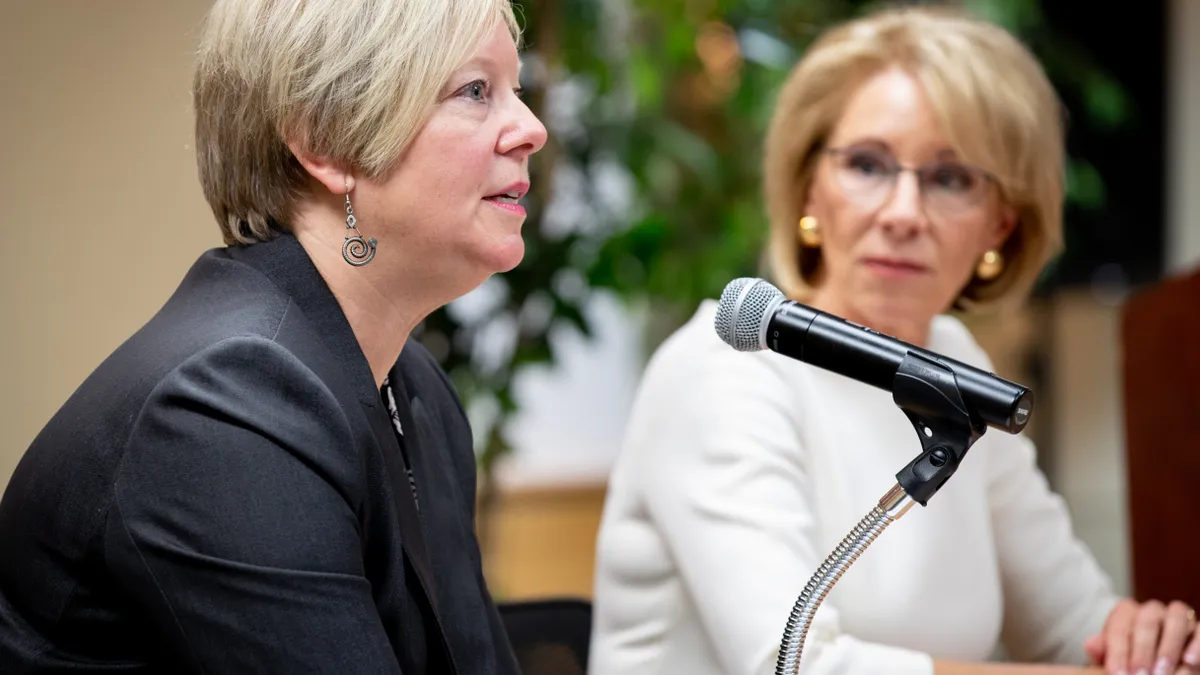Dive Brief:
-
The Education Department's internal oversight office on Wednesday announced it will review the agency's decision to reinstate its permanent recognition of the Accrediting Council for Independent Colleges and Schools (ACICS), The Associated Press reported.
-
The move is in response to a letter sent on Monday by the top congressional Democrats overseeing education policy to the department's Office of Inspector General. It questioned the extent of the department's latest review of ACICS and the authenticity of the support the accreditor said it received from other industry groups as a requirement for approval.
-
In their letter, Sen. Patty Murray, D-Wash., and Rep. Bobby Scott, D-Va., asked for an audit of the process by which the Ed Department reviewed ACICS's compliance with 21 accreditation criteria that the previous administration said it fell short of when it revoked its recognition in December 2016.
Dive Insight:
Scott and Murray's letter follows one that a group of congressional Democrats sent last week to Education Secretary Betsy DeVos that called on her to reverse the decision to return ACICS's recognition. In the letter, the group points to new evidence of "substantial erroneous and misleading information" in the department's report recommending ACICS get its status back.
Led by Sen. Elizabeth Warren, D-Mass., the Democrats narrowed in on endorsements ACICS said it obtained from five accreditors, though most of them told the lawmakers that they "carefully avoided asserting support, endorsement, or unequivocal acceptance of ACICS as a peer." The Ed Department had previously listed nine accreditors but replaced most of them after earlier inquiries revealed similar misinformation. The Ed Department said they were included due to "an inadvertent error in the editing process."
In their letter, Scott and Murray note the abrupt closure of for-profit college operator Education Corporation of America (ECA) also has bearing on ACICS, its accreditor. "Given ECA's record of fiscal problems," the letter states, "it appears the Department neglected to examine the accreditor's statutory and regulatory responsibility to assess its institutions' fiscal and administrative capacities" as well as their records of Title IV compliance.
ECA closed earlier this month after ACICS suspended its accreditation, noting concerns over "student progress, outcomes, student satisfaction, certification and licensure, and staff turnover." In a letter, ECA's CEO told the some 20,000 affected students that the Ed Department added new requirements that, along with the suspension of accreditation, made it difficult for ECA to stay open. It previously attempted to sue the Ed Department to avoid bankruptcy.
ACICS, meanwhile, was the accreditor for two other major for-profit operators — Corinthian Colleges and ITT Technical Institute — whose high-profile closures affected tens of thousands of students.
In a meeting with higher ed leaders yesterday, DeVos said there is a need to "rethink" higher ed and that accreditation will factor heavily into the discussion. "The current accreditation system, for instance, is costly, it favors the status quo, and it stymies competition," she said in prepared remarks. "And much of this is because the Department has overstepped and inserted itself into the work that Congress assigned to accreditors and institutions."
She said several issues related to accreditation need to be addressed in the upcoming negotiated rulemaking session, including the merits of existing regulations; the desire to embrace innovation without "unreasonable risk" for students and taxpayers; and how the department can support accreditors. She said the department also plans to make recognition of accreditors "less burdensome" and is "creating a tool" to improve information-sharing between them and the department.
DeVos caught flak for her move to reinstate ACICS' federal recognition even though it was out of compliance with two of 21 necessary standards. It was a major play in her department's efforts to reverse the Obama administration's crackdown on the for-profit sector.










